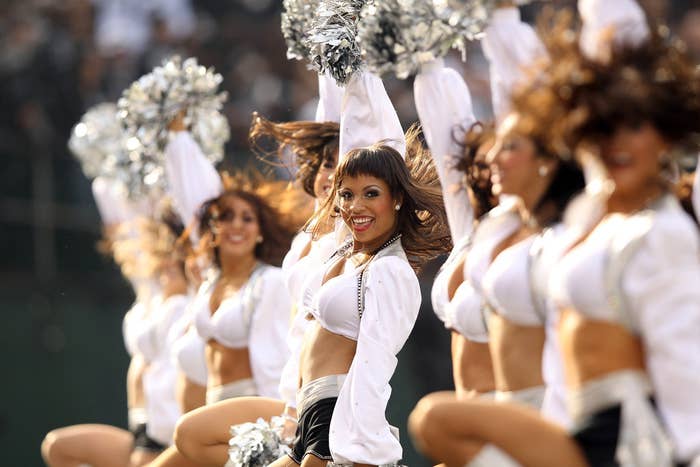
Cheerleaders for California-based sports teams are entitled to minimum wage, sick leave, and other legal protections that full employees receive, under a bill signed into law by Gov. Jerry Brown Wednesday afternoon. The law will take effect January 1, 2016.
The issue of professional cheerleaders' working conditions became a well-known issue last year when a Raiders cheerleader, Lacy T., filed a lawsuit against the team, claiming the cheerleaders were not paid for all the hours they were required to work. Additionally, the lawsuit claimed that Raiderettes were not reimbursed for "business expenses," were "paid a flat fee of $125 [per home game], regardless of the hours worked," and were required to make unpaid charity appearances.
The lawsuit against the Raiderettes set inspired a number of similar lawsuits against various NFL teams, most of them claiming similarly low and unfair compensation. Later that year, the Raiders settled for $1.25 million in backpay for cheerleaders who were Raiderettes between 2010 and 2013.
Cheerleaders in California had been considered contract employees, not full employees with benefits and rights under the California law.
California Assembly Bill 202, introduced by Assemblywoman Lorena Gonzalez, has successfully added an amendment to California's Labor Code that classifies cheerleaders for professional sports teams as employees. Up until the bill's signing, cheerleaders were considered contract employees and their employment was at will. Attorney Sharon Vinick, whose firm handled the lawsuits on behalf of the Raiderettes, called it "a clarification of existing labor law."
In a release, Gonzalez said Brown's signing was "an important step toward ensuring that multi-billion dollar sports teams treat cheerleaders with the same dignity and respect as every other employee who makes the game-day experience special."
Though similar bills have been introduced in New York State, Gonzalez hopes it does not take a state-by-state effort to change the labor laws to get cheerleaders standard employee protections. "The NFL needs to wake up and say they've been going about this the wrong way," Gonzalez said over the phone. "They could fix this. The ball is in their court."
An associated bill proposed by Gonzalez to legally define competitive cheerleading as a sport is similarly winding its way through the California legislature, passing easily through committees and the assembly floor. Classifying cheerleading as a sport would compel the California Interscholastic Federation to "develop guidelines, procedures, and safety standards."
Opposition to the bill within California legislature was minimal, with unspecific questions about the scope of the bill and the need for the clarification.
Gonzalez's background as a college cheerleader, an attorney, and CEO of the San Diego and Imperial Counties Labor Council made her a natural fit to introduce legislation to legally recognize cheerleaders for professional sport teams as employees.
"There are not a lot of other lawmakers who are former cheerleaders," Gonzalez joked in a phone interview in April.
During an April presentation of the bill to the Committee on Labor and Employment, Gonzalez pointed to the sexism demonstrated by not paying NFL cheerleaders:
"Every single person in that [the NFL stadium] experience is paid. Most of them, because these are public facilities in large cities, are paid beyond a minimum wage. In fact most of them are unionized and are paid a living page. The only exception to this are the cheerleaders on the field. And it's the only group — I don't know for sure, but I think it's the only group that is 100% women. This has been going on for decades, and it is an inequity that I don't think we can let stand."
Leslie Levy, who is a partner with Vinick, echoed Gonzalez's statement: "It's absolutely a gender issue. The NFL is ripe with sexism and this is just one example."
"The cheerleaders fear speaking out," said Levy. Contract employment is at will, and "hundreds of women line up to be cheerleaders," said Gonzalez.
BuzzFeed News reached out to 25 current and former California-based NFL cheerleaders, but received only one response: Caitlin Yates, a Raiderette who brought a lawsuit against the team, talked candidly about her experiences after speaking out.
After five seasons with the Raiders, Yates was moved to the back of the line despite her seniority, and found her fellow cheerleaders to be standoffish and coaches quiet around her.
Like Levy, Yates hopes that the law will give the women the power to speak about their experiences without fear of retaliation by their employers. During the April committee hearing, Yates' attorney Drexel Bradshaw said NFL teams have kept wages low by "creating a culture of fear among the women they employ to cheer on teams in billion-dollar industries."
"Whatever a woman chooses to pursue as a career, her rights and opportunities should be equal under the law," said Gonzalez.
